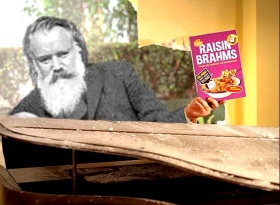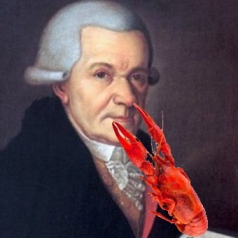GUTEN TAG! (Enjoying your Raisin-Brahms?)
I have just emerged from a rather trippy and viciously-cyclic period of PhD proposal development, hence the lack of posts in the last couple of months. It is in many ways a huge leap of faith finding an interesting and relevant topic (especially in a music-world heavily populated by scholarly types) that hasn’t yet been written about for no good reason.
Whenever I got close to narrowing a field and finding there was little existing research previously, I felt like being in the proverbial room of replaced-monkeys with the banana up a ladder that no-one is touching from second generation fear of the cold water spray but no-one actually knows why. If you don’t know that story I won’t go into it, but I just did.
In any case, my frustrations lurched between “Damn, this is a good topic but someone’s already written about it” and “Damn, no-one has written about this topic – there must be a reason why it’s not valid.” So in the end a leap of faith was required and I am presently in mid-leap… hoping there will be solid ground with no natural predators or environmental hazards on the other side. Just lots of fruit and chocolate.
Along the way I encountered some interesting PhD stereotypes. It is often tempting for ‘pure musicologists’ (aka people who write about music but have no/little musical experience) to end up with an absurdly specific and useless topic only tangentially concerned with music. Topics like:
“The histrionic effects of Franz Joseph Haydn’s brother Michael’s slow sonata movements for harpsichord on the emotional development of hatching red swamp crayfish.”
“Variations on the double constrictor knot formed in ipod headphones by accident in adolescent male coat pockets from 2005 to 2008”
“Why I like Bolognese”
Another recurring PhD type is from composers and more-aged-than-I performers who are lucky enough to draw on their experience and/or folio work to write about themselves. While this would indeed be a fascinating exercise my own effort would most likely turn into:
“Writing a PhD dissertation: An auto-ethnographical and self-aware study on itself”
Perhaps though the most frustrating variety tends to come from those undergoing PhD programs around the beginning of the modern scholarship era – around 1970. Those fortunate ones were at liberty to take advantage of a generally unexplored musical world, often with such reckless abandon as to propel themselves at entire fields in a single sitting, or able to simply just present very basic and fundamental facts as ground-breaking research, leaving future scholars to scavenge feebly in the muddied waters, eking out a merge existence on whatever niche topics can be found. Truly 1970’s scholars are the carp of the musical world, with dissertations such as:
“How to play the pianoforte well”
“I got here first! An analysis of everything ever by George Gershwin with specific focus on 90 other important American composers. Acknowledge me”
“Music: A summary”
I’m just am glad it’s over now. Many apologies (to those who accidentally stumble upon this website looking for marmot photos – you know who you are) for the delay and hopefully I’ll have a little more time and inspiration soon.






